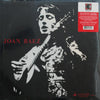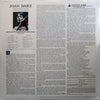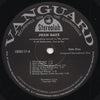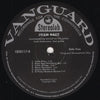







Joan Baez - Joan Baez
Vocals, Guitar – Joan Baez [click here to see more vinyl featuring Joan Baez]
Second Guitar – Fred Hellerman (A5-7, B2-3, B6)
A1-6 & B1-6 are traditional song arranged by Joan Baez
A7 : Lyrics by Aaron Zeitlin and Music by Sholom Secunda
1 LP, Stoughton old-style tip-on jacket
Original analog Master tape : YES
Heavy Press : 180g
Record color : Black
Speed : 33 RPM
Size : 12'’
Stereo
Studio
Record Press : Record Technology Incorporated (RTI)
Label : Concord Craft
Original label : Vanguard
Recorded over 4 nights in July 1960 at Manhattan Towers Hotel Ballroom, New York City
Engineered and mixed by Marc Aubort
Produced by Maynard Solomon
Mastered by Kevin Gray at Cohearent Audio
Originally released in October 1960
Reissued in November 2018
Tracks:
Side A:
- Silver Dagger
- East Virginia
- Fare Thee Well
- House Of The Rising Sun
- All My Trials
- Wildwood Flower
- Donna Donna
Side B:
- John Riley
- Rake And Rambling Boy
- Little Moses
- Mary Hamilton
- Henry Martin
- El Preso Numero Nueve
Reviews:
“Joan Baez recorded this Vanguard debut in 1960 at age 19. With her impossibly high and pure quavering voice and matching pristine finger picking guitar, she and this album created a sensation that helped shift the "folk-revival" back to authenticity from the commerciality into which it had drifted. Though while she sounded like a barefoot waif recently arrived from the Appalachian mountains, she was born on Staten Island. Her Mexico-born father who grew up in Brooklyn, the son of a minister, was a Stanford PhD credited with co-inventing the X-ray microscope. Her Scottish mother's father was an Anglican priest.
About the recording of this album, Baez told Kurt Loder in a Rolling Stone interview: "It took four nights. We were in some big, smelly ballroom (the Manhattan Towers Ballroom—ed.) at a hotel on Broadway, way up by the river. We couldn't record on Wednesday nights because they played bingo there. I would be down there on this dirty old rug with two microphones, one for the voice and one for the guitar. I just did my set; it was probably all I knew. Just put 'em down. I did "Mary Hamilton" once, that was it. That's the way we made 'em in the old days. As long as a dog didn't run through the room or something, you had it." — Kurt Loder, Rolling Stone, issue no. 393.
This album was for many youngsters the first encounter with "House of the Rising Sun" and the second for "All My Trials" known to Kingston Trio fans as "All My Sorrows" from its best selling 1959 album The Kingston Trio At Large. Songs like the bleak "Silver Dagger" and "East Virginia" and the love-anthem "Fare Thee Well" carried aloft by Baez's well-rehearsed and delivered performances resonated with a young generation of college and high schoolers eager to break free from their suburban chains. Helping greatly were Vanguard Records co-founder Maynard Solomon's erudite liner notes.
Perhaps the original record's warm atmospherics were an artifact of 1960's era stereo LP mastering but they make for easier listening compared to this reissue's somewhat stark, and occasionally bright "in your face" sonics that I'm sure are what's on the tape. The improvement in transient clarity and eerie transparency make up for the slightly forward balance—probably a microphone artifact. The solution is to lower the volume, which is a good idea anyway. That done, you are on the other side of the microphone in the empty "smelly ballroom", which Aubort no doubt chose to blot out with close miking. Other than on the tracks where Fred Hellerman joins Baez on guitar there's not much in the way of stereophony.
I have two black Vanguard Stereolab "originals". One mastered and processed by RCA, which was small Vanguard's "go-to" mastering and pressing house (my copy was pressed at RCA's Rockaway, NJ pressing plant), and the other a Columbia mastering (1D/1J) that takes the warmth and turns it into muffled and somewhat distant. Neither copy can match the quiet surfaces of this reissue, which I consider to be essential for any "well-rounded" AAA record collection.” Michael Fremer, Analog Planet, December 2018
“At the time of its release, Joan Baez's debut album was something of a revelation. The folk music revival was beginning to gather steam, stoked on the popular side by artists such as the Kingston Trio and the Easy Riders, as well as up-and-coming ensembles such as the Highwaymen, and on the more intense and serious side by the Weavers. The female singers on the scene were mostly old-time veteran activist types like Ronnie Gilbert and Malvina Reynolds, who was in her sixties. And then along comes this album, by a 19-year-old who looked more like the kind of co-ed every mother dreamt her son would come home with, displaying a voice from heaven, a soprano so pure and beguiling that the mere act of listening to her -- forget what she was singing -- was a pleasure. Baez's first album, made up primarily of traditional songs (including a startling version of "House of the Rising Sun"), was beguiling enough to woo even conservative-leaning listeners. Accompanied by the Weavers' Fred Hellerman and a pair of session singers, Baez gives a fine account of the most reserved and least confrontational aspects of the folk revival, presenting a brace of traditional songs (most notably "East Virginia" and "Mary Hamilton") with an urgency and sincerity that makes the listener feel as though they were being sung for the first time, and opening with a song that was to become her signature piece for many years, "Silver Dagger." The recording was notable for its purity of sound.” AllMusic Review by Bruce Eder
Ratings :
AllMusic : 5 / 5 ; Discogs : 4.5 / 5 ; Analog Planet : Music 10 / 11, Sound : 9 / 11


